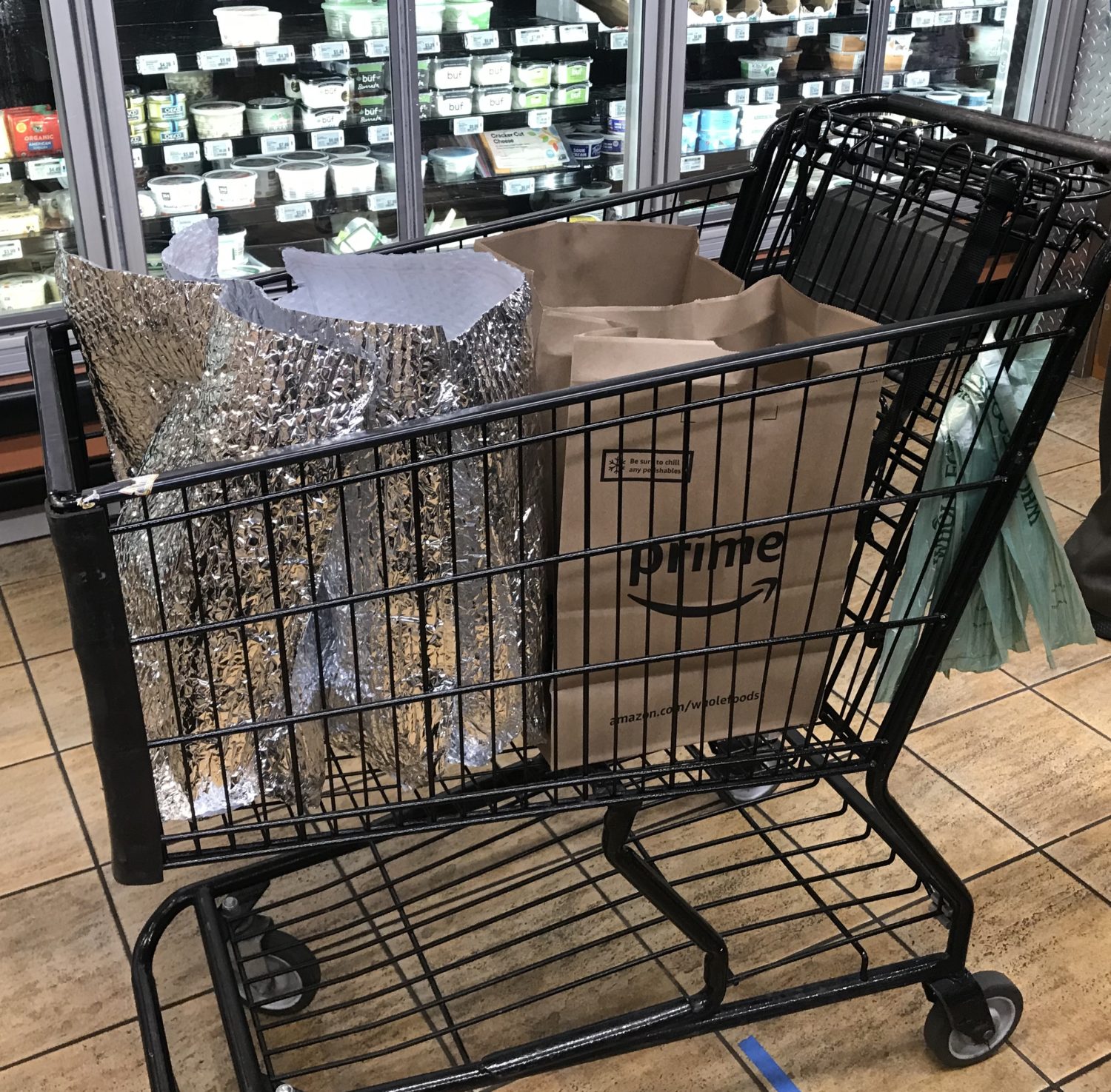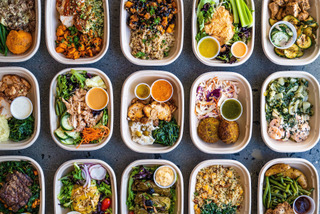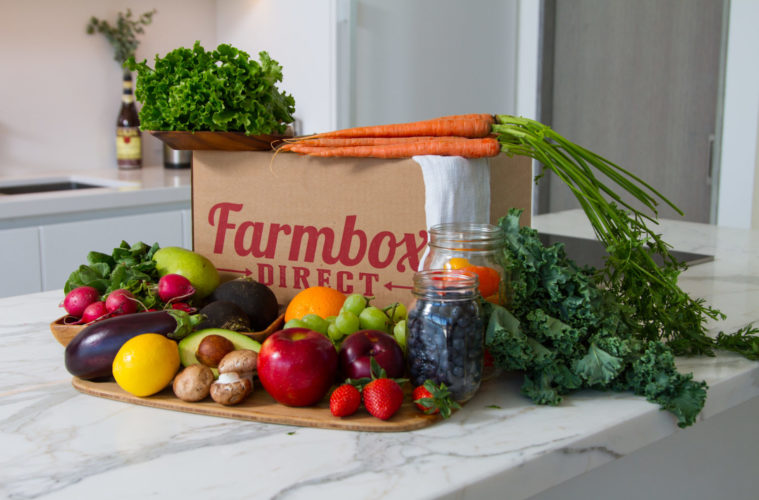As restaurants are temporarily shuttered and grocery stores resemble a scene from an apocalyptic film, Angelenos are having to rely on alternate services for sustenance. Twenty years ago, the impact of COVID-19 guidelines on our daily lives would have been much different, leaving us cut-off from services, forced to make do with whatever skills and ingredients we had. Thankfully, the year is 2020 and while this pandemic is devastating in many ways, anxieties are slightly eased by the modern technologies and inventions that keep us connected.
From grocery and food delivery to meal-prep and cooking kits, Los Angeles is adjusting to its new normal as indefinite restrictions are imposed by Governor Gavin Newsom and Mayor Eric Garcetti in an effort to slow the spread of the coronavirus.
While these new rules are meant to preserve and protect lives, local businesses can’t help but feel the negative effects. Restaurants and family-owned establishments need our support now more than ever, but for many that are facing coronavirus-related furloughs and layoffs, the money to frequently order to-go just isn’t there.
Thankfully, ordering services aren’t a limited menu, with budget-friendly alternatives available at the tap of an app that help to stretch food beyond one meal. How are services like these fairing in these uncertain times? We spoke with some popular online delivery services to learn how COVID-19 has changed the way they do business.

Many have seen a dramatic increase in customers, especially giants like Amazon and AmazonFresh. People are rushing to order whatever pantry-fillers they can, and workers are working tirelessly to restock and meet demand.
“We believe our role serving customers and the community during this time is a critical one. We’ve seen an increase in people shopping online for groceries and are working around the clock to continue to deliver grocery orders to customers as quickly as possible,” says the Amazon spokesperson we spoke to.
Instacart is a service that shops for you, sending out dedicated team members to places like Costco, Sprouts, even CVS, to get customers what they need. Offering grocery delivery from more than half of all grocery stores to residents in 5,500 cities across the country, Instacart has seen a significant surge in app downloads, as much as 4x on the Apple app store over the last week. Currently, the Instacart app ranks #2 in the Food and Drink category in both Apple and Google Play stores.
This past weekend, the service saw the highest customer demand in Instacart’s history in terms of groceries sold on their platform. They currently have the most shoppers they’ve ever had, calling them “household heroes” for assisting customers when they need them most.
“As consumer demand continues to climb, our teams are working around the clock to ensure we can reliably serve the millions of customers turning to Instacart as an essential service provider,” says Instacart. “With the purchase of more bulk items, busier stores overall, and longer check-out lines, we’re leaning on the flexibility of our dynamic delivery model to meet the needs of our customers.”
Given the unprecedented nature of this public health crisis, Instacart is working diligently with local and national authorities to ensure the safety of their staff, or “shoppers.” They are treading the line carefully – providing minimal disruption to service while also taking the appropriate precautionary measures to keep their teams, shoppers and customers safe. Safety measures include updated health and safety guidelines for shoppers, a new sick pay policy for all in-store shoppers nationwide, and additional extended pay for any Instacart shopper — both part-time employees and independent contractors — affected by COVID-19.
As each city levies their own restrictions and lockdowns, the availability of service adjusts.
“In some markets, based on overall demand, our customers may see delivery availability vary during busier request windows. In the majority of our deliveries over the last week, we’ve been able to meet same or next-day delivery requests for our customers. We’re committed to safely serving the entire Instacart community and continuing to be an essential service our customers can rely on during this busy time,” confirms Instacart.
According to the app, the average customer basket size on Instacart is up more than 20 percent month-over-month. The most popular searches this week? Hand sanitizer, vitamins, powdered milk, diapers, face masks and canned goods.
Safety is the name of the game for all, with more than 25 percent of all orders in the past week leveraging Instacart’s new “Leave at My Door” drop-off delivery option. Communities and families are taking care of their own, with more than 40 percent increase in the number of people using Instacart to place and send orders to others. Customers are using Instacart to send groceries to family, friends, and seniors across the country to ensure no one goes without. Those looking to do that same can enter the zip code of a friend or loved one into the app, select their desired store, fill the cart and check out to give the gift of groceries remotely.
Farmbox Direct is a produce delivery service that has experienced a significant swell in customers. Says Founder and CEO Ashley Tyrner, “as of Saturday, March 14, we have seen the number of orders double day after day.”
The company is working hard to meet the demand created by COVID-19 stay-at-home orders. “We have added two extra shipping days and a second shift to our workforce,” said Tyrner.
Tyrner is grateful for the growing demand, as it enables workers to remain employed during this difficult time, saying, “we are thankful for this rapid growth, as it is allowing my distributor the ability to not lay people off. This shift is taking people who would have been laid off and strategically repositioning them to a different shift and function to keep up with volume.”
Committed to helping the community get what they need, Farmbox Direct is offering customers a discount of 20 percent off on their first delivery. The discount code is “Immune20”.
Popular meal kit service Blue Apron is feeling the crush as well, with CEO Linda Findley Kozlowski stating: “Over the last week we have seen a sharp increase in consumer demand. We are increasing our capacity for future orders and expect to fulfill this increased demand by the next available weekly cycle, starting on 3/30. As a result, we have had to make changes to recipes and box orders for a small portion of volume next week. We are grateful for our customers’ patience during this unusual time.”
While many are dealing with job insecurity due to closures, Blue Apron has been able to use this influx of orders to boost the economy and provide jobs to those in need.
“We are hiring for temporary and permanent positions in our Linden, NJ and Richmond, CA fulfillment centers and hope to create employment opportunities for individuals who may have been displaced by the restaurant or food service industry,” explains Findley.
Echoing similar statements by city and state leaders, the company is not concerned about a potential food shortage. “We are carefully monitoring our supply chain and are in contact with our ingredient suppliers. We are not aware of any significant disruption to our supply chain to date as a result of coronavirus,” said Findley. “We believe we are positioned to support home cooks across the country during this time and we are doing everything we can to serve our customers.”

(Courtesy Territory Foods)
For those that want to eat healthy but balk at the idea of cooking, meal delivery services like Territory Foods are partnering with local chefs to provide nutritionist-approved feasts to Angelenos stuck inside. Los Angeles Territory Foods partners include Cafe Gratitude, Chef Terri Wahl, Marbled L.A., and more.
As of last Friday, the meal delivery service’s sales were up 120 percent as people began to prepare for the inevitable coronavirus shutdown. Already, L.A. is their second largest market with over a million meals a year ordered — with a surge in demand for plant-based, low carb offerings.
Their team spoke with L.A. Weekly, giving tips on how to ensure your delivery food is safe for consumption during the coronavirus pandemic:
“As with your choice of takeout provider, be sure that meal delivery services you are choosing are taking all the necessary precautions to assure your health and safety. Read any correspondences they are disseminating via email or social media or visit their website for information and updates,” says Frank Curto, former employee of USDA and head of quality and regulatory at Territory Foods.
“Additionally, since many of these services are providing food ingredients in the form of “meal kits” many of the ingredients and components require further preparation therefore, extending a portion of health and safety responsibility to you, the consumer. Be sure that you are practicing good food handling and hygienic practices during the storage and preparation of your food,” furthers Curto.
Like many others, Territory Foods has moved to a delivery-only model in adherence with Newsom’s guidelines.
“Our commitment to delivering safe, high-quality, delicious meals remains unchanged,” explains CEO of Territory Foods Abby Coleman. “Due to the closures of gyms, where our customers could pick up meals, we have now implemented a ‘delivery only’ system. All Territory Foods meals are delivered directly to our customer’s door—touch-free and no trips to the grocery store needed. We are working closely with our delivery partners to ensure we take all measures to reduce any exposure risks. Territory provides the foundation for healthy eating and healthy living. I believe in this as much for my own family as I do for our Territory community. These values are more important now than ever before, and we’re proud to be able to serve our communities.”
From take out, to grocery delivery, and meal kits, Los Angeles is seeing an exponential increase in options that fall in line with coronavirus-era prohibitions. Take care of yourself and protect your community by staying home and taking advantage of all that L.A. and the app store as to offer.
Advertising disclosure: We may receive compensation for some of the links in our stories. Thank you for supporting LA Weekly and our advertisers.

